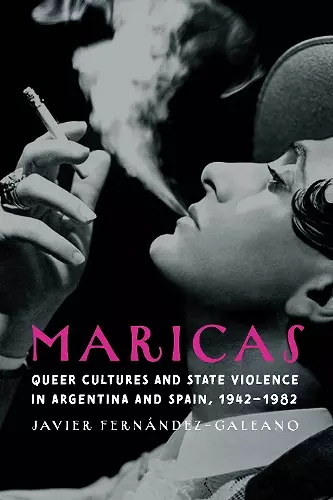Maricas
Queer Cultures and State Violence in Argentina and Spain, 1942–1982
Javier Fernández-Galeano author
Format:Hardback
Publisher:University of Nebraska Press
Published:1st Jun '24
£82.00
Supplier delay - available to order, but may take longer than usual.

In Maricas Javier FernÁndez-Galeano traces the erotic lives and legal battles of Argentine and Spanish gender- and sexually nonconforming people who carved out their own spaces in metropolitan and rural cultures between the 1940s and the 1980s. In both countries, agents of the state, judiciary, and medical communities employed “social danger” theory to measure individuals’ latent criminality, conflating sexual and gender nonconformity with legal transgression.
Argentine and Spanish queer and trans communities rejected this mode of external categorization. Drawing on Catholicism and camp cultures that stretched across the Atlantic, these communities constructed alternative models of identification that remediated state repression and sexual violence through the pursuit of the sublime, be it erotic, religious, or cultural. In this pursuit they drew ideological and iconographic material from the very institutions that were most antagonistic to their existence, including the Catholic Church, the military, and reactionary mass media. Maricas incorporates non-elite actors, including working-class and rural populations, recruits, prisoners, folk music fans, and defendants’ mothers, among others. The first English-language monograph on the history of twentieth-century state policies and queer cultures in Argentina and Spain, Maricas demonstrates the many ways queer communities and individuals in Argentina and Spain fought against violence, rejected pathologization, and contested imposed, denigrating categorization.
"FernÁndez-Galeano's book highlights the myriad ways in which queer communities resisted violence, challenged pathologization, and created a vibrant culture. As such, it contributes to a nuanced understanding of LGBTQ+ history in Argentina and Spain."-Paula Halperin, Americas "Maricas is a brilliant work that will be of interest to anyone working on the history of sexuality, comparative and transnational methodologies, visual studies and archival research."-Patricio Simonetto, Gender & History “A major contribution to queer studies, FernÁndez-Galeano’s dual focus on Argentina and Spain adds an original lens to a subject that is traditionally approached through a national perspective. His creative analysis of a multiplicity of subjects, including tourism, fashion, and military culture, and his smart combination of archives goes beyond state policing and repression to offer a rich understanding of the desires, rules, and aims of queer communities on their own terms.”-Natalia Milanesio, author of Destape: Sex, Democracy, and Freedom in Postdictatorial Argentina “Extremely well researched. . . . The particular methodology and focus of this book make a profound contribution to ongoing developments in the field. . . . The specialist reader will be captivated by this book; the interested reader will find the work revealing.”-Richard Cleminson, coauthor of “Los Invisibles”: A History of Male Homosexuality in Spain, 1850–1939
ISBN: 9781496234971
Dimensions: unknown
Weight: unknown
342 pages